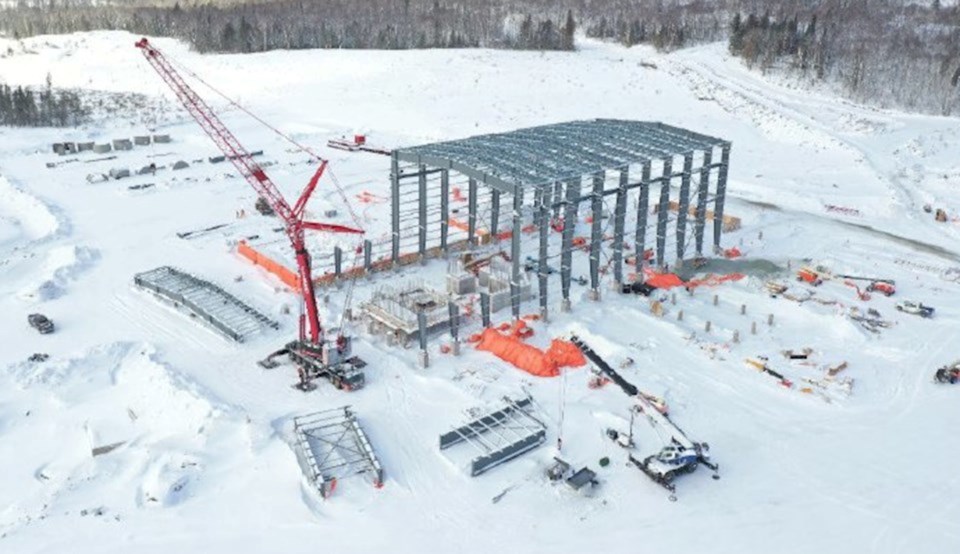Management at cash-strapped Argonaut Gold said it hopes to have financing in place by the end of June to be able to push its Magino mine project to completion in two years.
The Toronto mining company held a May 12 conference call and webcast to go over its first-quarter financials and production numbers, and update the progress on a debt-financing plan as Magino hits the midway point of construction.
Argonaut has four mines in Mexico and Nevada. Magino, located outside Dubreuilville in northeastern Ontario, will be its first operation in Canada.
The call also marked the debut of new president-CEO Larry Radford, Argonaut’s hand-picked turnaround artist, selected in March to keep Magino's construction work on schedule.
Argonaut announced in December that the capital needed to complete the open-pit mine had ballooned from $510 million to $800 million, attributing the increased cost to inflation and the pandemic. Argonaut founder and CEO Pete Dougherty left the company at that time.
A company review of the estimated cost to finish Magino now indicates the cost will be 15 per cent higher — $120 million — than originally reported in December.
With a provincewide strike of crane operators and carpenters only a week old, the company said, for now, they're adhering on the timetable for the first gold pour in March 2023.
Sign up for our mining newsletter to get all the up-to-date news on mining in Northern Ontario.
In his opening remarks, Radford said coming into this situation, with a mine construction project experiencing significant cost overruns, is “not new to me."
Hired in early March, Radford stepped into the office on March 21 and immediately began focussing on Magino. The company has $605 million committed to the mine project and is putting together a debt-financing plan. He said the company remains “cautiously optimistic” financing will be in place by the end of the second quarter. Discussions with lenders are described as "advanced."
Concurrently, Argonaut is also fleshing out its “strategic alternatives.” When Radford was asked by a mining analyst if those alternatives include an outright sale or divestment of mining assets, he responded those conversations run “the whole universe of strategic options.”
Argonaut cautioned there could be a possible curtailment of spending at Magino if financing were not in place by the end of next month. It could result in the winding down of activity at the site.
"Let me be clear that that’s the last resort and we haven’t got there yet,” said Radford.
He reminded analysts of Magino’s value if they can persevere to get the project up and running. It’s an “economically robust” mine in the middle of gold country.
Their neighbour to the east is Alamos Gold’s high-grade Island Gold Mine, now undergoing a third phase of expansion.
Magino’s projected mine life is 19 years. The high-grade gold discovered under and near the proposed pit will likely extend its longevity.
Radford regards the open pit alone as a “big needle-mover” for Argonaut, but the high-grade gold “cannot be ignored.” Eventually, operations will transition into an underground mining scenario.
The “tremendous potential” with Argonaut and Magino is what attracted him to the job. He called the deposit a “game-changing asset” for a company of Argonaut’s size.
A second-generation miner who is passionate about the industry, Radford said he put himself through engineering school while working as an underground miner.
Over his nearly 40-year career working in technical and operations positions for Hecla Mining, Kinross Gold and Barrick Gold, Radford said he’s spent the last 15 years involved in “fixing situations that have gotten off the rails, for one reason or another.”
“I didn’t intend my career to evolve in that way, but that’s how it turned out.”
Want more business news from the North? Subscribe to our newsletter.
Argonaut has a lot riding on Magino as the bulk of its gold production will shift from Mexico to Magino. The planned 10,000-tonne-per-day pit project is forecasted to produce 142,000 ounces in its first five years with lower operating costs per tonne than its other assets outside Canada.
At the site, 14 kilometres outside Dubreuilville, the company said good progress is being made on finishing the on-site processing plant; however, they're still susceptible to the challenges facing other mine builders these days, namely COVID-19, the Ukraine-Russia war, weather, labour disruptions, a tight labour market, inflation, and supply chain delays.
A possible schedule wrecker is the crane operators' strike, which could impact work on the processing plant. If it continues for an extended period of time it may delay the project’s commissioning.
Dan Symons, Argonaut’s vice-president of investor relations, noted their main contractor, Ausenco Engineering, is “very likely” looking into securing non-unionized subcontractors to continue work. He said the feedback they're getting from the site is that unionized contractors would rather not be on strike, but the majority of those votes to strike came from the Toronto area for that union.




